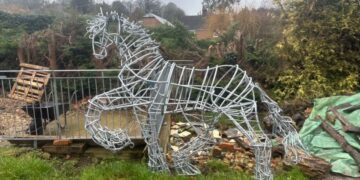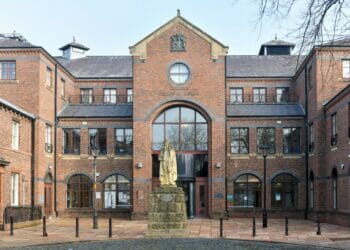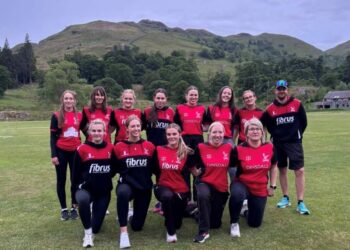
Swiftly and without hesitation, past and present Penrith managers queued up to congratulate Grant Davidson after he clocked up more than 500 games in a club shirt.
One — Matt Henney — hailed him as a “defensive colossus”.
Jim Nichols, meanwhile, spoke of him as “a real leader who will die for the cause”. All applauded his versatility, loyalty and longevity.
But perhaps current club chairman Brian “Billy” Williams — an ex-Penrith player with several spells as manager under his belt and, like Davidson, a man with blue blood running through his veins — summed up the long-serving first team captain most succinctly of all.
“Our committee here is an ageing one,” said Williams.

“When you get people like Grant coming along it gives you a lift and makes you think all the work you’re doing is worthwhile, because he sets such an example to everybody else.
“Certainly to the 300-400 juniors we’ve got. They’ll look at Grant and how he conducts himself. He’s always been a blessing to the club but I think now he’s reached legendary status.”
It was on Penrith’s Castletown Rec that Davidson, now 33, first got his kicks on town turf, at the renowned “nappy squad” run by Irwin Wallace, which, among others, also launched Adam Collin and Danny Grainger towards professional careers.
Davidson represented Pategill juniors, progressing to Penrith United and also Wetheriggs United before being invited to train at Penrith AFC in the summer of 2009.
Pre-season sessions continued at the Northern League club’s former Southend Road home under the joint management of Richard Prokas — whose training invite Davidson had accepted — and James Tose, before 2009-10 fixtures kicked off at the brand new Frenchfield Park stadium.
“When I got the call I was honoured and scared at the same time,” recalled Davidson.

“There were some big players down at Penrith. So I did wonder if I could make the step up to that level. It was a huge achievement to play for Penrith — growing up I always wanted to play for them at Southend Road, that was the goal.
“Playing at Frenchfield Park didn’t take the shine off it, though. The thrill and excitement of playing at the new stadium was brilliant and to play in front of a lot more fans than I was used to was amazing.”
Davidson’s first training session was Tose’s, too. “I remember turning to Richard (Prokas) and saying ‘who’s the lad there? He looks a decent player, strong, good on the ball’,” Tose said.
“Richard said ‘it’s Grant Davidson; he’s been playing for Wetheriggs; he’s a good player’.
“He would give everything in training, give everything in matches and was such a versatile player — you could put him anywhere on the pitch. I think we played him right back, centre half, centre mid, and centre forward at some points. He was effective in every single role.”
Davidson’s debut campaign, which ended with a Cumberland Cup final triumph, was spent at full back before he briefly returned to Westmorland League side Wetheriggs.
But he returned to Penrith in 2011-12 — for good, as it would transpire — soon receiving the captain’s armband, which he continues to proudly wear, from manager Henney, an equally wholehearted ex-Workington and Barrow midfielder.
“A leader by example,” Henney said of Davidson. “He plays the way you want every player to approach a game of football. If you had a team of Grants you’d be successful.
“You can count on one hand the games where Grant might have been below a seven out of 10; he’s Mr Consistency, a colossus of a defender.”
Averaging almost 50 appearances a season, rarely suffering injury, and going more than two whole campaigns without missing a single game, Davidson racked up match number 500 in the FA Cup against West Allotment Celtic in September. He reached 512 in a home win over Northallerton Town in early November before a mid-season COVID suspension intervened.
“It’s an honour to play for, and captain, a great club run by great people,” said Davidson, who attracted numerous admirers but rejected offers to join Shildon, Workington and the now defunct Celtic Nation.
He stayed put, he revealed, because “Penrith Football Club means everything”.
“I hope the spark I had growing up to play for Penrith is still there in kids growing up now — it’s a massive achievement to represent your home town club,” he added.
Davidson’s current manager, Dave Hewson, said: “Grant’s been an unbelievable servant to football and to Penrith FC.
“I’ve got nothing but admiration and respect for the way he approaches and plays every game, and I think young people should look at him as an example.”
Other former managers echoed Hewson’s thoughts. “He’s committed, passionate, enthusiastic,” said Andy Coyles, now a coach at fellow Northern League side Consett.
John Clasper, Penrith’s manager in 2011-12, recalled: “It was clear then that Grant displayed many valued leadership qualities in addition to his football skills and thirst to play and win.
“It is really pleasing to see that he has proved to be a loyal servant to Penrith AFC and a captain and model of consistency over many years.”
And Nichols, now in charge of Carlisle City, observed: “It’s always tough at Penrith; it’s always difficult. But when you’ve got someone like Grant you always feel
that you’ve got a chance because you’ve got a real leader, somebody who’ll die for the cause.
“Penrith are very lucky to have had two players in the last few years, in Willy Paul and Grant, who have committed their footballing careers to the club.”
Yet family members have always been the main driving force for Davidson, who works as a yard manager for Cumbria Quarrying Services.
He cites his late father John (who also played for Wetheriggs) as his biggest influence, and expressed huge gratitude for the backing of his wife, Anna, and young daughter, Vienna.
“As long as I’ve known Grant he has played football, and had full commitment to Penrith Football Club,” said Anna.
“He thinks very highly of the club.
“Football is very important to Grant — it’s not just a hobby; it plays a very important part in his life.
“Vienna and I are very proud of him and I know his dad would have been as well.”































